First Semester Learning: A Reflective Essay on Social Work Ethics
VerifiedAdded on 2023/06/10
|5
|1031
|190
Essay
AI Summary
This reflective essay details a student's learning experience during their first semester of social work studies. It emphasizes the importance of ethical considerations, professional boundaries, and anti-discriminatory practices as guided by the British Association of Social Workers (BASW). The student reflects on developing skills such as professional curiosity, collaborative work, and effective communication, while also acknowledging areas for improvement. The Gibb’s reflective model is used to analyze the semester, covering feelings, evaluation, and planned actions for future development. The essay concludes with a commitment to practical experience through diverse case studies and potential NGO involvement to enhance professional growth.
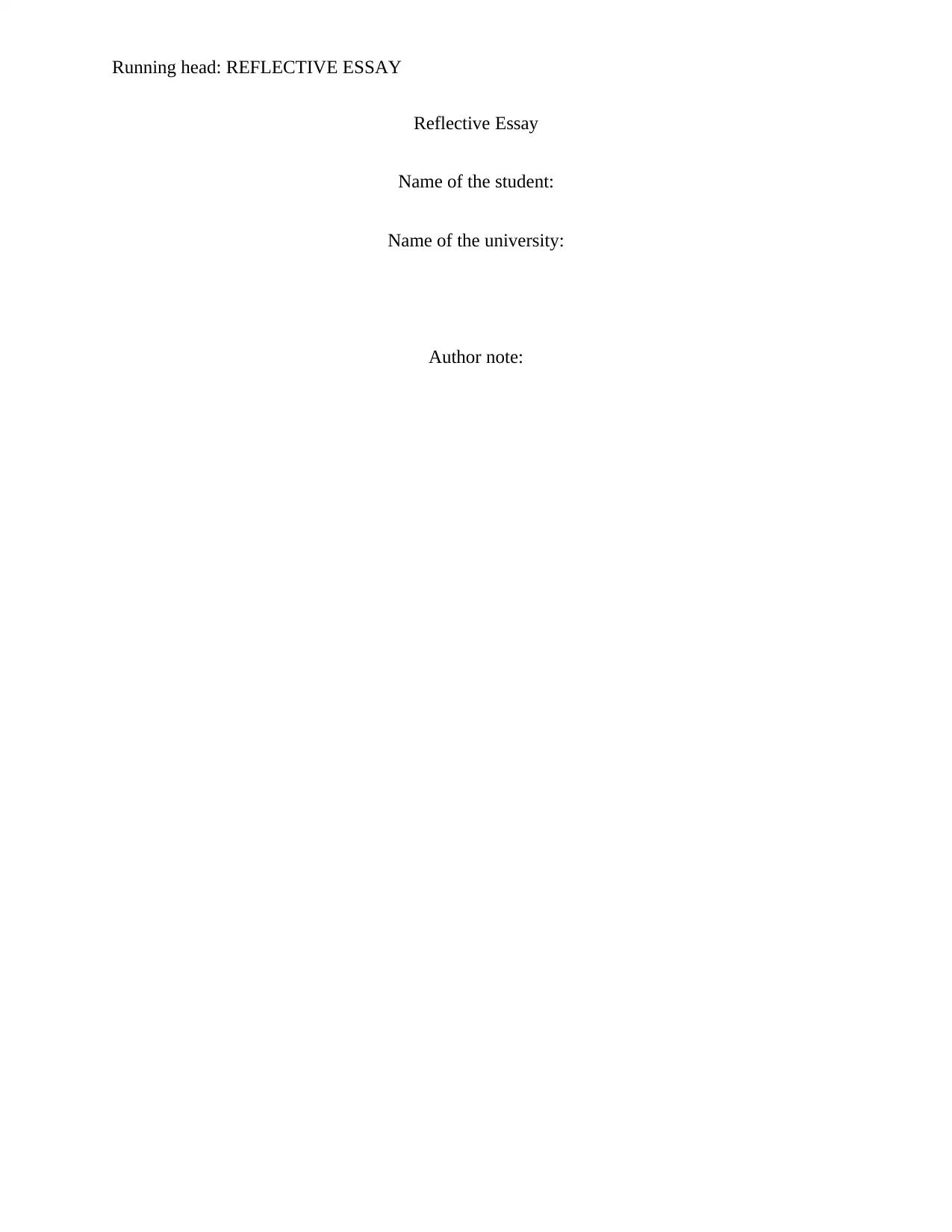
Running head: REFLECTIVE ESSAY
Reflective Essay
Name of the student:
Name of the university:
Author note:
Reflective Essay
Name of the student:
Name of the university:
Author note:
Paraphrase This Document
Need a fresh take? Get an instant paraphrase of this document with our AI Paraphraser
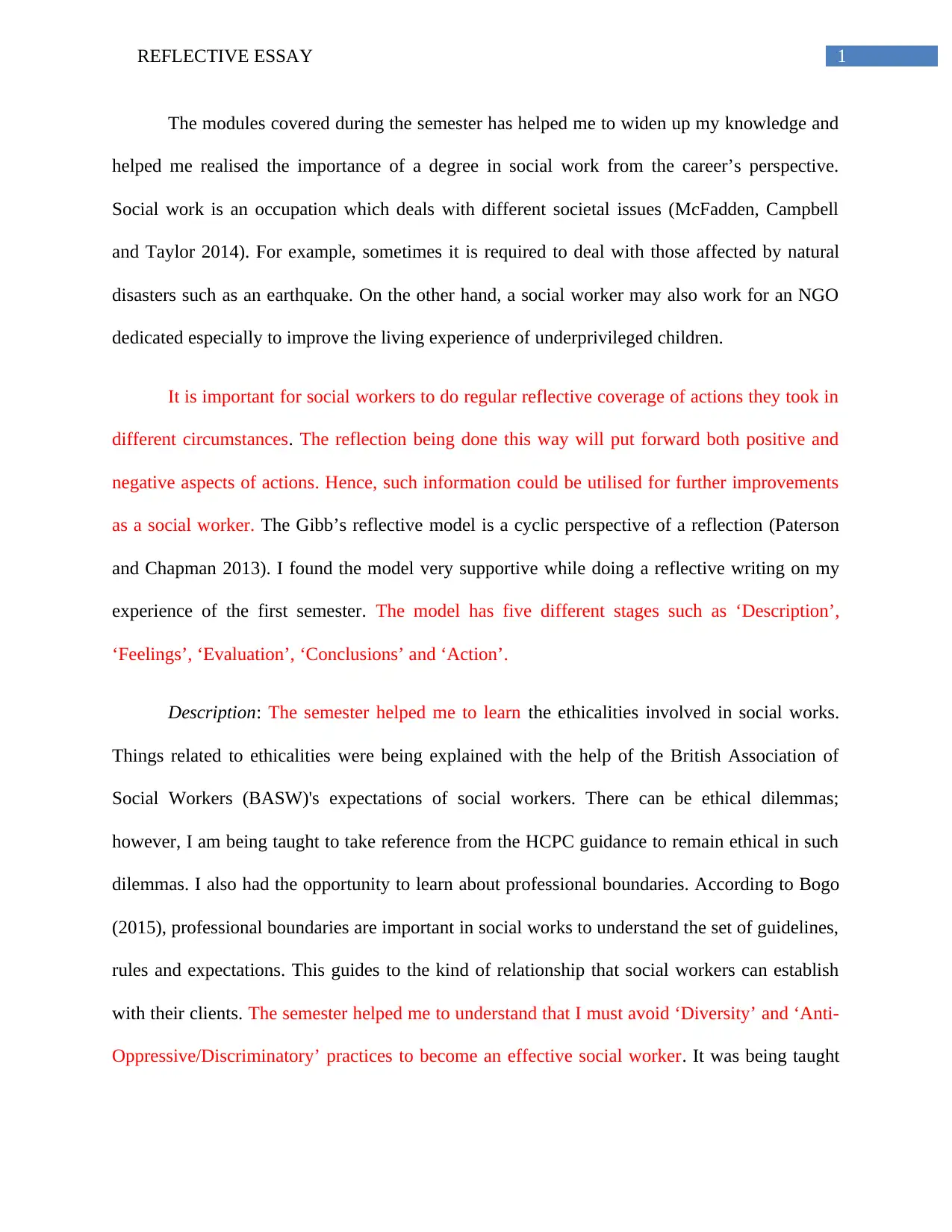
1REFLECTIVE ESSAY
The modules covered during the semester has helped me to widen up my knowledge and
helped me realised the importance of a degree in social work from the career’s perspective.
Social work is an occupation which deals with different societal issues (McFadden, Campbell
and Taylor 2014). For example, sometimes it is required to deal with those affected by natural
disasters such as an earthquake. On the other hand, a social worker may also work for an NGO
dedicated especially to improve the living experience of underprivileged children.
It is important for social workers to do regular reflective coverage of actions they took in
different circumstances. The reflection being done this way will put forward both positive and
negative aspects of actions. Hence, such information could be utilised for further improvements
as a social worker. The Gibb’s reflective model is a cyclic perspective of a reflection (Paterson
and Chapman 2013). I found the model very supportive while doing a reflective writing on my
experience of the first semester. The model has five different stages such as ‘Description’,
‘Feelings’, ‘Evaluation’, ‘Conclusions’ and ‘Action’.
Description: The semester helped me to learn the ethicalities involved in social works.
Things related to ethicalities were being explained with the help of the British Association of
Social Workers (BASW)'s expectations of social workers. There can be ethical dilemmas;
however, I am being taught to take reference from the HCPC guidance to remain ethical in such
dilemmas. I also had the opportunity to learn about professional boundaries. According to Bogo
(2015), professional boundaries are important in social works to understand the set of guidelines,
rules and expectations. This guides to the kind of relationship that social workers can establish
with their clients. The semester helped me to understand that I must avoid ‘Diversity’ and ‘Anti-
Oppressive/Discriminatory’ practices to become an effective social worker. It was being taught
The modules covered during the semester has helped me to widen up my knowledge and
helped me realised the importance of a degree in social work from the career’s perspective.
Social work is an occupation which deals with different societal issues (McFadden, Campbell
and Taylor 2014). For example, sometimes it is required to deal with those affected by natural
disasters such as an earthquake. On the other hand, a social worker may also work for an NGO
dedicated especially to improve the living experience of underprivileged children.
It is important for social workers to do regular reflective coverage of actions they took in
different circumstances. The reflection being done this way will put forward both positive and
negative aspects of actions. Hence, such information could be utilised for further improvements
as a social worker. The Gibb’s reflective model is a cyclic perspective of a reflection (Paterson
and Chapman 2013). I found the model very supportive while doing a reflective writing on my
experience of the first semester. The model has five different stages such as ‘Description’,
‘Feelings’, ‘Evaluation’, ‘Conclusions’ and ‘Action’.
Description: The semester helped me to learn the ethicalities involved in social works.
Things related to ethicalities were being explained with the help of the British Association of
Social Workers (BASW)'s expectations of social workers. There can be ethical dilemmas;
however, I am being taught to take reference from the HCPC guidance to remain ethical in such
dilemmas. I also had the opportunity to learn about professional boundaries. According to Bogo
(2015), professional boundaries are important in social works to understand the set of guidelines,
rules and expectations. This guides to the kind of relationship that social workers can establish
with their clients. The semester helped me to understand that I must avoid ‘Diversity’ and ‘Anti-
Oppressive/Discriminatory’ practices to become an effective social worker. It was being taught
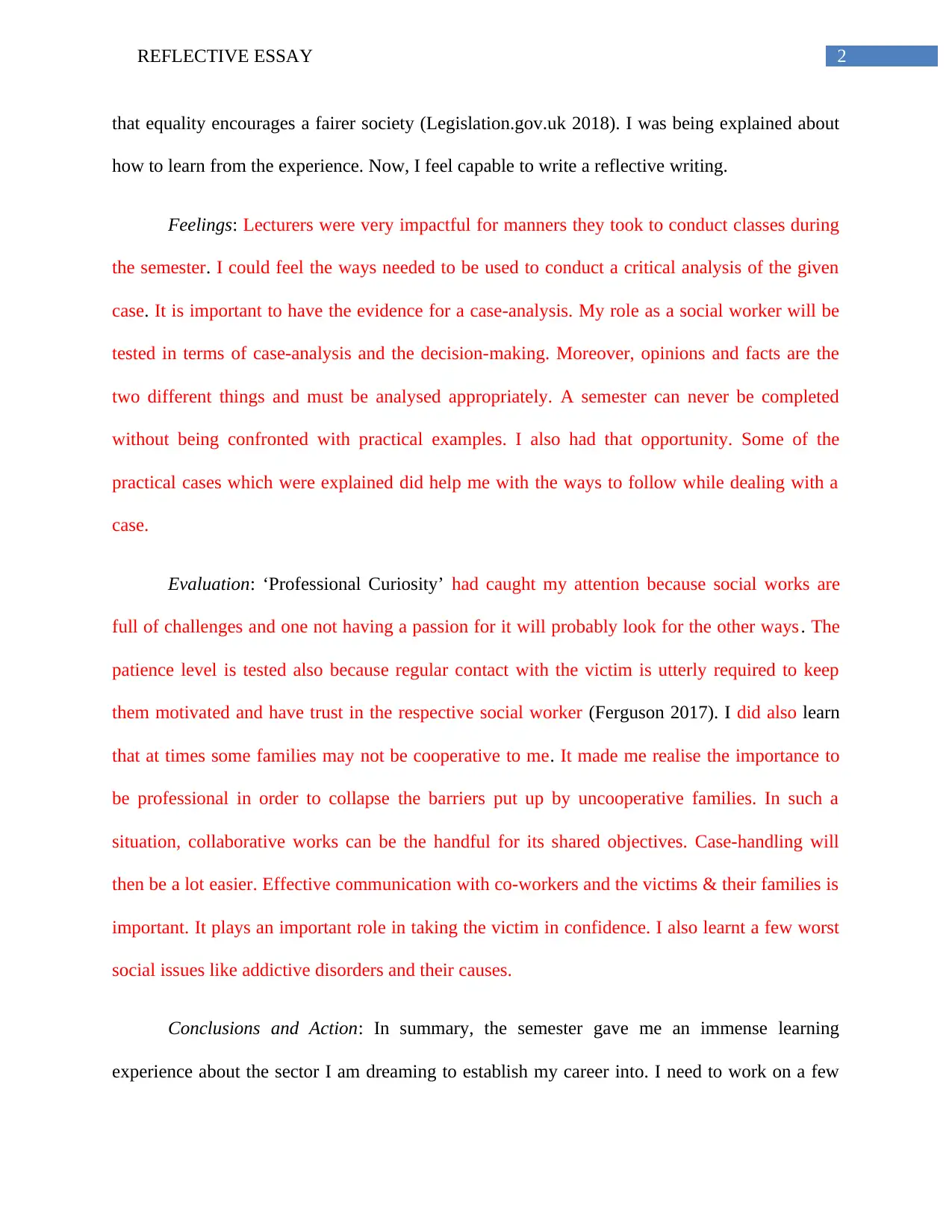
2REFLECTIVE ESSAY
that equality encourages a fairer society (Legislation.gov.uk 2018). I was being explained about
how to learn from the experience. Now, I feel capable to write a reflective writing.
Feelings: Lecturers were very impactful for manners they took to conduct classes during
the semester. I could feel the ways needed to be used to conduct a critical analysis of the given
case. It is important to have the evidence for a case-analysis. My role as a social worker will be
tested in terms of case-analysis and the decision-making. Moreover, opinions and facts are the
two different things and must be analysed appropriately. A semester can never be completed
without being confronted with practical examples. I also had that opportunity. Some of the
practical cases which were explained did help me with the ways to follow while dealing with a
case.
Evaluation: ‘Professional Curiosity’ had caught my attention because social works are
full of challenges and one not having a passion for it will probably look for the other ways. The
patience level is tested also because regular contact with the victim is utterly required to keep
them motivated and have trust in the respective social worker (Ferguson 2017). I did also learn
that at times some families may not be cooperative to me. It made me realise the importance to
be professional in order to collapse the barriers put up by uncooperative families. In such a
situation, collaborative works can be the handful for its shared objectives. Case-handling will
then be a lot easier. Effective communication with co-workers and the victims & their families is
important. It plays an important role in taking the victim in confidence. I also learnt a few worst
social issues like addictive disorders and their causes.
Conclusions and Action: In summary, the semester gave me an immense learning
experience about the sector I am dreaming to establish my career into. I need to work on a few
that equality encourages a fairer society (Legislation.gov.uk 2018). I was being explained about
how to learn from the experience. Now, I feel capable to write a reflective writing.
Feelings: Lecturers were very impactful for manners they took to conduct classes during
the semester. I could feel the ways needed to be used to conduct a critical analysis of the given
case. It is important to have the evidence for a case-analysis. My role as a social worker will be
tested in terms of case-analysis and the decision-making. Moreover, opinions and facts are the
two different things and must be analysed appropriately. A semester can never be completed
without being confronted with practical examples. I also had that opportunity. Some of the
practical cases which were explained did help me with the ways to follow while dealing with a
case.
Evaluation: ‘Professional Curiosity’ had caught my attention because social works are
full of challenges and one not having a passion for it will probably look for the other ways. The
patience level is tested also because regular contact with the victim is utterly required to keep
them motivated and have trust in the respective social worker (Ferguson 2017). I did also learn
that at times some families may not be cooperative to me. It made me realise the importance to
be professional in order to collapse the barriers put up by uncooperative families. In such a
situation, collaborative works can be the handful for its shared objectives. Case-handling will
then be a lot easier. Effective communication with co-workers and the victims & their families is
important. It plays an important role in taking the victim in confidence. I also learnt a few worst
social issues like addictive disorders and their causes.
Conclusions and Action: In summary, the semester gave me an immense learning
experience about the sector I am dreaming to establish my career into. I need to work on a few
⊘ This is a preview!⊘
Do you want full access?
Subscribe today to unlock all pages.

Trusted by 1+ million students worldwide
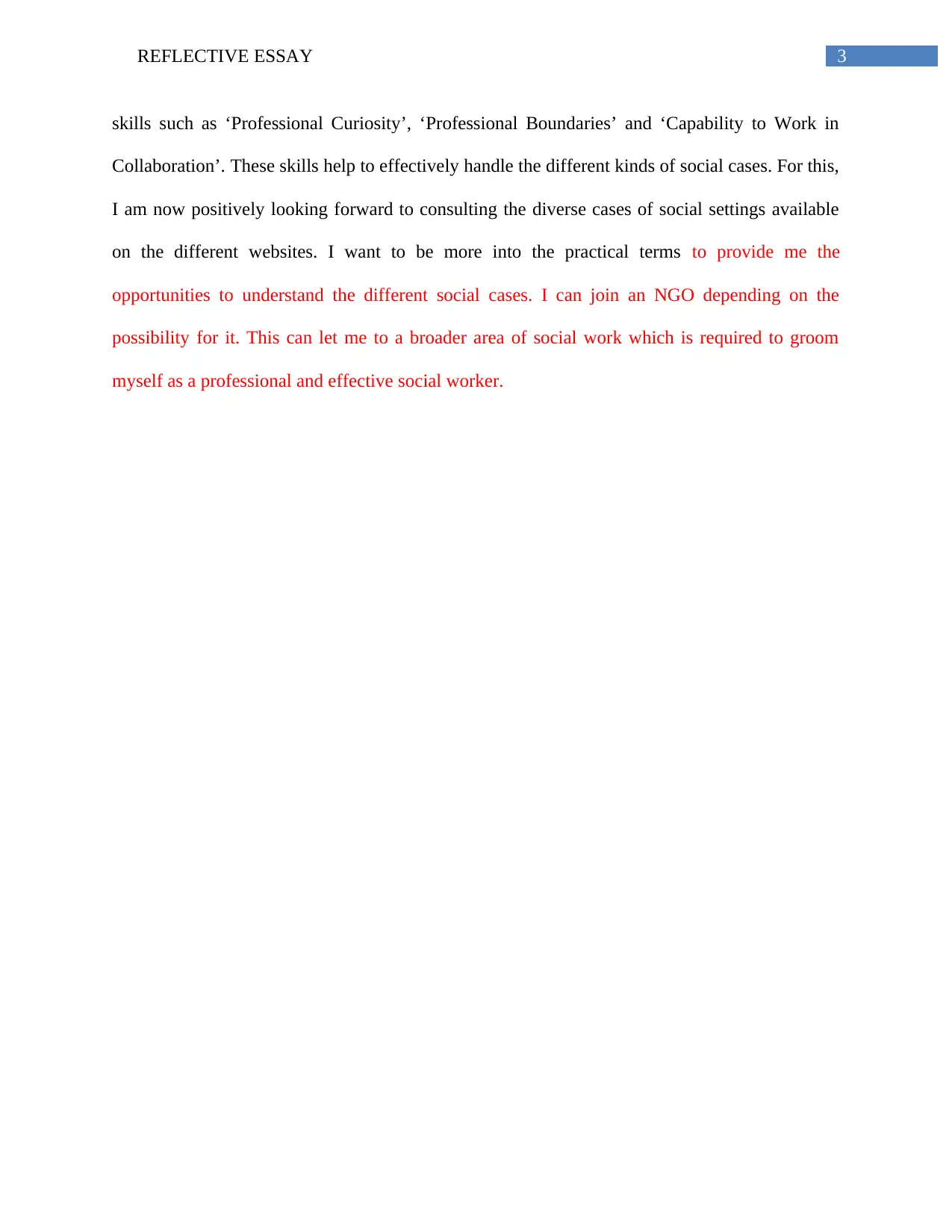
3REFLECTIVE ESSAY
skills such as ‘Professional Curiosity’, ‘Professional Boundaries’ and ‘Capability to Work in
Collaboration’. These skills help to effectively handle the different kinds of social cases. For this,
I am now positively looking forward to consulting the diverse cases of social settings available
on the different websites. I want to be more into the practical terms to provide me the
opportunities to understand the different social cases. I can join an NGO depending on the
possibility for it. This can let me to a broader area of social work which is required to groom
myself as a professional and effective social worker.
skills such as ‘Professional Curiosity’, ‘Professional Boundaries’ and ‘Capability to Work in
Collaboration’. These skills help to effectively handle the different kinds of social cases. For this,
I am now positively looking forward to consulting the diverse cases of social settings available
on the different websites. I want to be more into the practical terms to provide me the
opportunities to understand the different social cases. I can join an NGO depending on the
possibility for it. This can let me to a broader area of social work which is required to groom
myself as a professional and effective social worker.
Paraphrase This Document
Need a fresh take? Get an instant paraphrase of this document with our AI Paraphraser
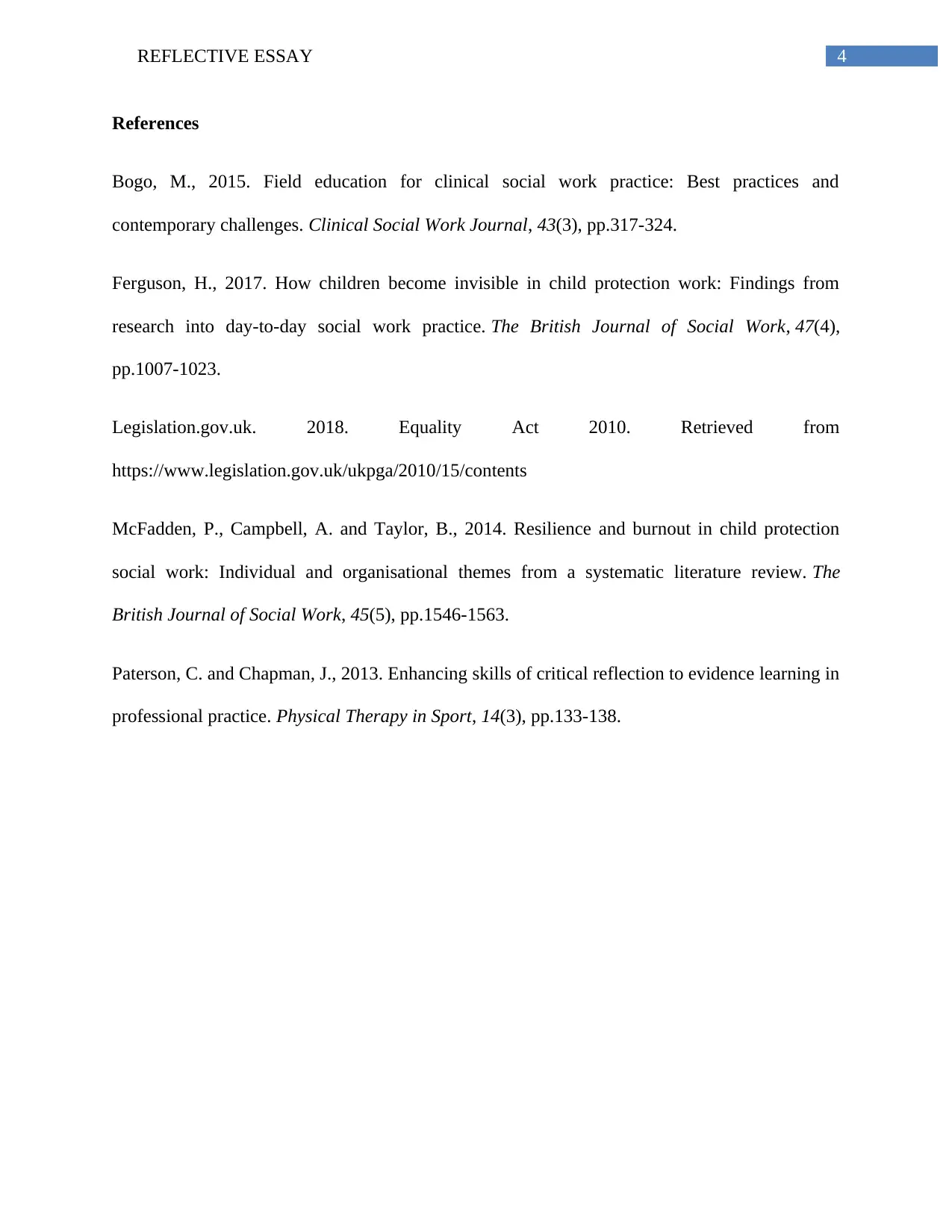
4REFLECTIVE ESSAY
References
Bogo, M., 2015. Field education for clinical social work practice: Best practices and
contemporary challenges. Clinical Social Work Journal, 43(3), pp.317-324.
Ferguson, H., 2017. How children become invisible in child protection work: Findings from
research into day-to-day social work practice. The British Journal of Social Work, 47(4),
pp.1007-1023.
Legislation.gov.uk. 2018. Equality Act 2010. Retrieved from
https://www.legislation.gov.uk/ukpga/2010/15/contents
McFadden, P., Campbell, A. and Taylor, B., 2014. Resilience and burnout in child protection
social work: Individual and organisational themes from a systematic literature review. The
British Journal of Social Work, 45(5), pp.1546-1563.
Paterson, C. and Chapman, J., 2013. Enhancing skills of critical reflection to evidence learning in
professional practice. Physical Therapy in Sport, 14(3), pp.133-138.
References
Bogo, M., 2015. Field education for clinical social work practice: Best practices and
contemporary challenges. Clinical Social Work Journal, 43(3), pp.317-324.
Ferguson, H., 2017. How children become invisible in child protection work: Findings from
research into day-to-day social work practice. The British Journal of Social Work, 47(4),
pp.1007-1023.
Legislation.gov.uk. 2018. Equality Act 2010. Retrieved from
https://www.legislation.gov.uk/ukpga/2010/15/contents
McFadden, P., Campbell, A. and Taylor, B., 2014. Resilience and burnout in child protection
social work: Individual and organisational themes from a systematic literature review. The
British Journal of Social Work, 45(5), pp.1546-1563.
Paterson, C. and Chapman, J., 2013. Enhancing skills of critical reflection to evidence learning in
professional practice. Physical Therapy in Sport, 14(3), pp.133-138.
1 out of 5
Related Documents
Your All-in-One AI-Powered Toolkit for Academic Success.
+13062052269
info@desklib.com
Available 24*7 on WhatsApp / Email
![[object Object]](/_next/static/media/star-bottom.7253800d.svg)
Unlock your academic potential
Copyright © 2020–2026 A2Z Services. All Rights Reserved. Developed and managed by ZUCOL.





